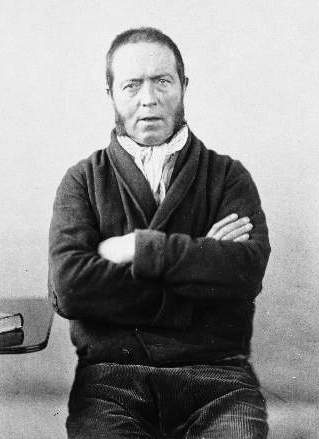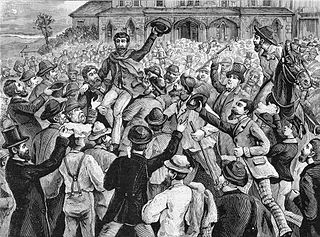
Arraignment is a formal reading of a criminal charging document in the presence of the defendant, to inform them of the criminal charges against them. In response to arraignment, in some jurisdictions, the accused is expected to enter a plea; in other jurisdictions, no plea is required. Acceptable pleas vary among jurisdictions, but they generally include guilty, not guilty, and the peremptory pleas setting out reasons why a trial cannot proceed. Pleas of nolo contendere and the Alford plea are allowed in some circumstances.

In court proceedings, a defendant is a person or object who is the party either accused of committing a crime in criminal prosecution or against whom some type of civil relief is being sought in a civil case.
The insanity defense, also known as the mental disorder defense, is an affirmative defense by excuse in a criminal case, arguing that the defendant is not responsible for their actions due to a psychiatric disease at the time of the criminal act. This is contrasted with an excuse of provocation, in which the defendant is responsible, but the responsibility is lessened due to a temporary mental state. It is also contrasted with the justification of self defense or with the mitigation of imperfect self-defense. The insanity defense is also contrasted with a finding that a defendant cannot stand trial in a criminal case because a mental disease prevents them from effectively assisting counsel, from a civil finding in trusts and estates where a will is nullified because it was made when a mental disorder prevented a testator from recognizing the natural objects of their bounty, and from involuntary civil commitment to a mental institution, when anyone is found to be gravely disabled or to be a danger to themself or to others.

The M'Naghten rule(s) (pronounced, and sometimes spelled, McNaughton) is a legal test defining the defence of insanity, first formulated by House of Lords in 1843. It is the established standard in UK criminal law, and versions have also been adopted in some US states (currently or formerly), and other jurisdictions, either as case law or by statute. Its original wording is a proposed jury instruction:
that every man is to be presumed to be sane, and ... that to establish a defence on the ground of insanity, it must be clearly proved that, at the time of the committing of the act, the party accused was labouring under such a defect of reason, from disease of the mind, as not to know the nature and quality of the act he was doing; or if he did know it, that he did not know he was doing what was wrong.
A plea bargain is an agreement in criminal law proceedings, whereby the prosecutor provides a concession to the defendant in exchange for a plea of guilt or nolo contendere. This may mean that the defendant will plead guilty to a less serious charge, or to one of the several charges, in return for the dismissal of other charges; or it may mean that the defendant will plead guilty to the original criminal charge in return for a more lenient sentence.

The Sixth Amendment to the United States Constitution sets forth rights related to criminal prosecutions. It was ratified in 1791 as part of the United States Bill of Rights. The Supreme Court has applied all but one of this amendment's protections to the states through the Due Process Clause of the Fourteenth Amendment.
Criminal procedure is the adjudication process of the criminal law. While criminal procedure differs dramatically by jurisdiction, the process generally begins with a formal criminal charge with the person on trial either being free on bail or incarcerated, and results in the conviction or acquittal of the defendant. Criminal procedure can be either in form of inquisitorial or adversarial criminal procedure.
Civil procedure is the body of law that sets out the rules and regulations along with some standards that courts follow when adjudicating civil lawsuits. These rules govern how a lawsuit or case may be commenced; what kind of service of process is required; the types of pleadings or statements of case, motions or applications, and orders allowed in civil cases; the timing and manner of depositions and discovery or disclosure; the conduct of trials; the process for judgment; the process for post-trial procedures; various available remedies; and how the courts and clerks must function.
A lawsuit is a proceeding by one or more parties against one or more parties in a civil court of law. The archaic term "suit in law" is found in only a small number of laws still in effect today. The term "lawsuit" is used with respect to a civil action brought by a plaintiff who requests a legal remedy or equitable remedy from a court. The defendant is required to respond to the plaintiff's complaint or else risk default judgment. If the plaintiff is successful, judgment is entered in favor of the defendant. A variety of court orders may be issued in connection with or as part of the judgment to enforce a right, award damages or restitution, or impose a temporary or permanent injunction to prevent an act or compel an act. A declaratory judgment may be issued to prevent future legal disputes.
In a civil proceeding or criminal prosecution under the common law or under statute, a defendant may raise a defense in an effort to avert civil liability or criminal conviction. A defense is put forward by a party to defeat a suit or action brought against the party, and may be based on legal grounds or on factual claims.

In common law jurisdictions, an acquittal means that the prosecution has failed to prove that the accused is guilty beyond a reasonable doubt of the charge presented. It certifies that the accused is free from the charge of an offense, as far as criminal law is concerned. The finality of an acquittal is dependent on the jurisdiction. In some countries, such as the United States, an acquittal prohibits the retrial of the accused for the same offense, even if new evidence surfaces that further implicates the accused. The effect of an acquittal on criminal proceedings is the same whether it results from a jury verdict or results from the operation of some other rule that discharges the accused. In other countries, like Australia and the UK, the prosecuting authority may appeal an acquittal similar to how a defendant may appeal a conviction — but usually only if new and compelling evidence comes to light or the accused has interfered with or intimidated a juror or witness.
The presumption of innocence is a legal principle that every person accused of any crime is considered innocent until proven guilty. Under the presumption of innocence, the legal burden of proof is thus on the prosecution, which must present compelling evidence to the trier of fact. If the prosecution does not prove the charges true, then the person is acquitted of the charges. The prosecution must in most cases prove that the accused is guilty beyond a reasonable doubt. If reasonable doubt remains, the accused must be acquitted. The opposite system is a presumption of guilt.

Discovery, in the law of common law jurisdictions, is a phase of pretrial procedure in a lawsuit in which each party, through the law of civil procedure, can obtain evidence from other parties by means of methods of discovery such as interrogatories, requests for production of documents, requests for admissions and depositions. Discovery can be obtained from nonparties using subpoenas. When a discovery request is objected to, the requesting party may seek the assistance of the court by filing a motion to compel discovery. Conversely, a party or nonparty resisting discovery can seek the assistance of the court by filing a motion for a protective order.
A public defender is a lawyer appointed to represent people who otherwise cannot reasonably afford to hire a lawyer to defend themselves in a trial. Several countries provide people with public defenders, including the UK, Belgium, Hungary and Singapore, and some states of Australia. Brazil is the only country in which an office of government-paid lawyers with the specific purpose of providing full legal assistance and representation to the needy free of charge is established in the constitution. The Sixth Amendment to the US Constitution, as interpreted by the Supreme Court, requires the US government to provide legal counsel to indigent defendants in criminal cases. Public defenders in the United States are lawyers employed by or under contract with county, state or federal governments.

In England and Wales, a magistrates' court is a lower court which hears matters relating to summary offences and some triable either-way matters. Some civil law issues are also decided here, notably family proceedings. In 2010, there were 320 magistrates' courts in England and Wales; by 2020, a decade later, 164 of those had closed. The jurisdiction of magistrates' courts and rules governing them are set out in the Magistrates' Courts Act 1980.
In criminal law, the right to counsel means a defendant has a legal right to have the assistance of counsel and, if the defendant cannot afford a lawyer, requires that the government appoint one or pay the defendant's legal expenses. The right to counsel is generally regarded as a constituent of the right to a fair trial. Historically, however, not all countries have always recognized the right to counsel. The right is often included in national constitutions. Of the 194 constitutions currently in force, 153 have language to this effect.
EDO MBM Technology Ltd v Campaign to Smash EDO and Others was a High Court of Justice civil action brought by EDO MBM Technology Ltd, a subsidiary of EDO Corporation, against protesters in Brighton, that began in April 2005 and was settled by March 2006.
Criminal costs are financial penalties awarded against convicted criminals, in addition to the sentence they receive, in recognition of the costs of the court in bringing the prosecution.

The Libel Act 1843, commonly known as Lord Campbell's Libel Act, was an Act of the Parliament of the United Kingdom. It enacted several important codifications of and modifications to the common law tort of libel.
The Assistance of Counsel Clause of the Sixth Amendment to the United States Constitution provides: "In all criminal prosecutions, the accused shall enjoy the right...to have the Assistance of Counsel for his defence."







